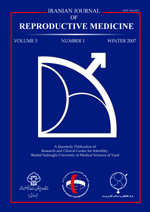
|
International Journal of Reproductive BioMedicine
Research and Clinical Center for Infertility, Shahid Sadoughi University of Medical Sciences of Yazd
ISSN: 1680-6433
EISSN: 1680-6433
Vol. 13, No. 10, 2015, pp. 657-664
|
 Bioline Code: rm15085
Bioline Code: rm15085
Full paper language: English
Document type: Short Communication
Document available free of charge
|
|
|
International Journal of Reproductive BioMedicine, Vol. 13, No. 10, 2015, pp. 657-664
| en |
Prevention of birth defects in the pre-conception period: knowledge and practice of health care professionals (nurses and doctors) in a city of Southern Brazil
Ferreira, Flávia Romariz; Akiba, Heloisa Regina Russo; Júnior, Edward Araujo; Figueiredo, Elisabeth Niglio & Abrahão, Anelise Riedel
Abstract
Background: Some congenital defects can be prevented in the pregestational stage. However, many health professionals are not prepared to provide counselling to couples regarding the same.
Objective: This study aimed to assess the performance of doctors and nurses from a primary health-care unit in Florianopolis, Brazil, in preventing birth defects in the preconception period based on the recommendations of the Control Center of Disease Prevention.
Materials and Methods: This descriptive cross sectional study was performed at a
tertiary referral center. In this study, a semi-structured questionnaire was provided to
160 health professionals comprising doctors and nurses who were actively involved
in providing primary health care in family health programs. The non-parametric Chisquare
(χ2) test was used to analyse the data obtained through multiple choice
questions.
Results: Our results showed that although 81.9% of health professionals provided
health-care assistance based on protocols, and only 46.2% professionals were aware
of the presence of the topic in the protocol. Of the recommendations provided by the
Control Center of Disease Prevention, the use of folic acid was the most prescribed.
However, this prescription was not statistically different between nurses and doctors
(P=0.85).
Conclusion: This study identified the fragile nature in these professional’s knowledge about the prevention of birth defects in pre-conception period, as evidenced by the inconsistency in their responses.
Keywords
Congenital defects; Public health; Primary prevention
|
| |
© Copyright 2015 - Iranian Journal of Reproductive Medicine
Alternative site location: http://www.ijrm.ir
|
|
